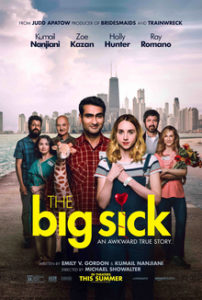The Big Sick
Posted on June 22, 2017 at 5:53 pm
B +| Lowest Recommended Age: | Mature High Schooler |
| MPAA Rating: | Rated R for language including some sexual references |
| Profanity: | Strong and explicit language |
| Alcohol/ Drugs: | Alcohol |
| Violence/ Scariness: | Very serious illness |
| Diversity Issues: | A theme of the movie |
| Date Released to Theaters: | June 24, 2017 |
| Date Released to DVD: | September 25, 2017 |

The more specific the story, the more universal. This is a very specific story. Indeed, you are unlikely ever again to see a romantic comedy with one of the pair spending half of the film in a coma. And that is not the couple’s biggest obstacle. Kumail Nanjiani (“Silicon Valley”), plays a character named Kumail Nanjiani in a story based on his relationship to Emily V. Gordon (played by Zoe Kazan and called Emily Gardiner in the film), who is now his wife and the co-screenwriter of the smart, touching, heartfelt and very funny film. It is beautifully directed by Michael Showalter, as always unsurpassed in meticulous casting of even the smallest roles.
Real-life Nanjiani and his movie alter ego are Pakistani immigrants from traditional families. Every time he visits his parents for dinner, an unmarried Pakistani woman “happens to drop in.” They have made it very clear that they expect him to marry a woman who is Pakistani and Muslim. Gordon is neither; she is white and from North Carolina. Just after they break up because he could not say that they could have a future together, she suddenly becomes critically ill and is placed in a medically induced coma. He gets the call when she is hospitalized and has to be the one to call her parents. He meets them for the first time in the hospital waiting room, where they are understandably frosty (he broke their daughter’s heart) and preoccupied (she’s in a coma).
They would rather that he not be there. And his parents find out that he has not been honest with them and they tell him they cannot accept his feelings for Emily. So, in the second half of the movie there is another kind of love story, about the love between parents and their children and the partners their children choose.
It is also a story about a man learning to be honest with himself about who he is and what he wants. What lifts this out of the recent glut of arrested development movies is its compassion for all parties (the film nicely acknowledges that Nanjiani’s brother has a very successful and satisfying marriage arranged the traditional way and presents as one of the candidates a woman so seemingly perfect for him that we almost root for her) and Nanjiani’s thoughtful, self-deprecating but confident performance. The best stand-up comics mine their own lives for material, with observations that make us see our own lives, and especially our follies and irrationalities, in sharper relief — that’s relief in both senses of the word.
Best of all, the movie itself is proof that they lived happily ever after.
Parents should know that this movie includes strong language, sexual references and non-explicit situations, family conflict, and very serious illness.
Family discussion: Why didn’t Kumail tell Emily about his family’s concerns? How should you decide what traditions to keep and which ones to leave behind?
If you like this, try: “Ruby Sparks” (also with Kazan, who wrote the screenplay) and “50-50” with Joseph Gordon-Levitt and Seth Rogen, also based on a true story
